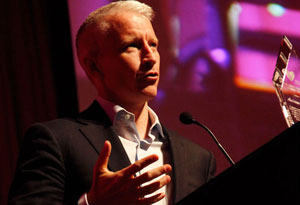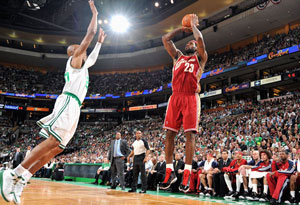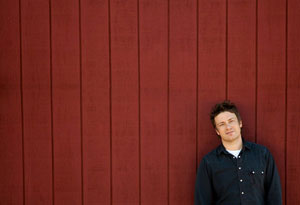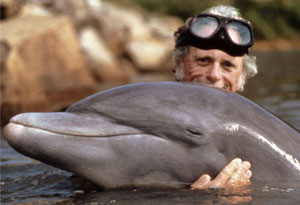
Photo: Brian To/Getty Images
Anderson Cooper: The power of showing up
For weeks after Hurricane Katrina, the silver-haired CNN anchor doggedly waded through stagnant water and government double-talk, speaking aloud the thought each of us was having: "Why isn't anyone doing anything to fix this?" Five years later, as oil gushed into the Gulf of Mexico, he asked that question again—and vowed to keep it up until he got an answer. As host of AC360°, Cooper, 43, has proved himself relentless when it comes to showing us the truth and humanity in every story. We wondered if he'd always been so tenacious. So we asked his mom.
When he was very little—no more than 2—if someone suggested that he do something a certain way and he disagreed, he'd say, 'You do what you do, and I do what I do.' He's always done things his way. When he was 17, he went to Africa and ended up with malaria. He knew if I found out, I'd insist he return—so he didn't tell me he was in a Kenyan hospital. But his determination never caused any arguments, because I'm over-the-moon proud of him for being so passionate about everything he does. And he's been that way from the beginning. — Gloria Vanderbilt
See the books that made a difference to Anderson Cooper
For weeks after Hurricane Katrina, the silver-haired CNN anchor doggedly waded through stagnant water and government double-talk, speaking aloud the thought each of us was having: "Why isn't anyone doing anything to fix this?" Five years later, as oil gushed into the Gulf of Mexico, he asked that question again—and vowed to keep it up until he got an answer. As host of AC360°, Cooper, 43, has proved himself relentless when it comes to showing us the truth and humanity in every story. We wondered if he'd always been so tenacious. So we asked his mom.
When he was very little—no more than 2—if someone suggested that he do something a certain way and he disagreed, he'd say, 'You do what you do, and I do what I do.' He's always done things his way. When he was 17, he went to Africa and ended up with malaria. He knew if I found out, I'd insist he return—so he didn't tell me he was in a Kenyan hospital. But his determination never caused any arguments, because I'm over-the-moon proud of him for being so passionate about everything he does. And he's been that way from the beginning. — Gloria Vanderbilt
See the books that made a difference to Anderson Cooper

Photo: Jesse D. Garrabrant/Getty Images
LeBron James: The power of seizing the moment
By the time LeBron James settled into a directors' chair in front of the ESPN cameras to announce—in a prime-time special called The Decision, which had been marketed with all the subtlety of a Kardashian wedding—where, as he put it, "I'm going to take my talents to" this fall, everyone from Rush Limbaugh to Larry King to the leader of the free world had weighed in. The prognostications had already drowned out the NBA finals, not to mention the BP oil spill, and were dominating the 24-hour news cycle like a Lohan lockup. Even LeBron himself looked nervous, like the 25-year-old he is. Millions of basketball fans and culture junkies nationwide crammed sports bars and living rooms to watch this modern-day king make his decree. And then, almost immediately, they called for his head.
Footage of Cleveland fans burning LBJ jerseys ran alongside his image in real time. NBA legends Johnson, Jordan, and Barkley suggested the move to Miami had tarnished LeBron's legacy. "He'll never be Jordan," Barkley growled. Cavs owner Dan Gilbert condemned the "several day, narcissistic, self-promotional buildup," an accusation that echoed from all quarters.
But the backlash was pure hypocrisy. The media and fans alike had furnished a seat for LBJ at the center of the world, then seemed irked when he took it. Worse, the one-note vilification ignored the nobility of LeBron's move: He took less money to win championships, the sports world's ultimate selfless act. Consider the $6 million in ad revenue generated by The Decision that went to charitable causes, and suddenly the picture looks a whole lot less sinister.
LeBron may never be MJ, although according to the stats, he's just a hairsbreadth behind—while coming off as a heckuva nicer guy. LBJ will get his rings, and that'll be gravy. Because just to watch him bound, sprint, and orbit above the rim is to behold the exuberant power of youth. To that, we are all witnesses. — David Gargill, writer for GQ and Harper's
By the time LeBron James settled into a directors' chair in front of the ESPN cameras to announce—in a prime-time special called The Decision, which had been marketed with all the subtlety of a Kardashian wedding—where, as he put it, "I'm going to take my talents to" this fall, everyone from Rush Limbaugh to Larry King to the leader of the free world had weighed in. The prognostications had already drowned out the NBA finals, not to mention the BP oil spill, and were dominating the 24-hour news cycle like a Lohan lockup. Even LeBron himself looked nervous, like the 25-year-old he is. Millions of basketball fans and culture junkies nationwide crammed sports bars and living rooms to watch this modern-day king make his decree. And then, almost immediately, they called for his head.
Footage of Cleveland fans burning LBJ jerseys ran alongside his image in real time. NBA legends Johnson, Jordan, and Barkley suggested the move to Miami had tarnished LeBron's legacy. "He'll never be Jordan," Barkley growled. Cavs owner Dan Gilbert condemned the "several day, narcissistic, self-promotional buildup," an accusation that echoed from all quarters.
But the backlash was pure hypocrisy. The media and fans alike had furnished a seat for LBJ at the center of the world, then seemed irked when he took it. Worse, the one-note vilification ignored the nobility of LeBron's move: He took less money to win championships, the sports world's ultimate selfless act. Consider the $6 million in ad revenue generated by The Decision that went to charitable causes, and suddenly the picture looks a whole lot less sinister.
LeBron may never be MJ, although according to the stats, he's just a hairsbreadth behind—while coming off as a heckuva nicer guy. LBJ will get his rings, and that'll be gravy. Because just to watch him bound, sprint, and orbit above the rim is to behold the exuberant power of youth. To that, we are all witnesses. — David Gargill, writer for GQ and Harper's

Photo: Courtesy of Jamie Oliver
Jamie Oliver: The power of the pea
"This is going to kill your children early," the British chef Jamie Oliver tells a woman on national TV. They gaze at the unhealthy food on the table before them—the huge mound of pizza, doughnuts, and corn dogs the woman's family consumes in a week. "Yes," she says, crying. "I'm killing them." Oliver rubs her shoulder and says, "But we can stop that."
This belief, that we have the ability to transform the way we eat, is what makes Oliver so compelling. He's certainly not the first to note that diet-related disease is the biggest killer in the United States, nor the first to point out that food labeling in this country is a disgrace. What makes Oliver different is his willingness to do whatever it takes to change what's on our plates—even if it means dressing up as a pea pod for the edification of first graders, as he did on an episode of Jamie Oliver's Food Revolution.
That show aimed to change the way America's then-fattest city was feeding its kids, but the city in question, Huntington, West Virginia, was initially unimpressed. "Who made you king?" asked a local radio host. "We don't want to sit around and eat lettuce all day." A run-in with the school lunch ladies was so hostile that Oliver cried on camera.
Anybody else would have given up. Oliver persevered. By the time he left town, the radio host had bought a Crock-Pot (the better to simmer a healthy stew with), and the lunch ladies were telling parents that Oliver's fresh food "is much better for the kids" than the processed pizza they used to serve.
Oliver is a food missionary with one simple belief: Change what you eat, and you change the world. In other words, give peas a chance. — Ruth Reichl
"This is going to kill your children early," the British chef Jamie Oliver tells a woman on national TV. They gaze at the unhealthy food on the table before them—the huge mound of pizza, doughnuts, and corn dogs the woman's family consumes in a week. "Yes," she says, crying. "I'm killing them." Oliver rubs her shoulder and says, "But we can stop that."
This belief, that we have the ability to transform the way we eat, is what makes Oliver so compelling. He's certainly not the first to note that diet-related disease is the biggest killer in the United States, nor the first to point out that food labeling in this country is a disgrace. What makes Oliver different is his willingness to do whatever it takes to change what's on our plates—even if it means dressing up as a pea pod for the edification of first graders, as he did on an episode of Jamie Oliver's Food Revolution.
That show aimed to change the way America's then-fattest city was feeding its kids, but the city in question, Huntington, West Virginia, was initially unimpressed. "Who made you king?" asked a local radio host. "We don't want to sit around and eat lettuce all day." A run-in with the school lunch ladies was so hostile that Oliver cried on camera.
Anybody else would have given up. Oliver persevered. By the time he left town, the radio host had bought a Crock-Pot (the better to simmer a healthy stew with), and the lunch ladies were telling parents that Oliver's fresh food "is much better for the kids" than the processed pizza they used to serve.
Oliver is a food missionary with one simple belief: Change what you eat, and you change the world. In other words, give peas a chance. — Ruth Reichl

Photo: Courtesy of Richard O'Barry
Richard O'Barry: The power of passion
Richard O'Barry has a unique calling. "If there's a dolphin anywhere in the world that's in trouble," he says, "my phone rings." Through a combination of techniques that include undercover operations and negotiations with hunters, governments, and dolphin-exhibiting businesses, O'Barry has rescued dolphins in the Bahamas, Nicaragua, Brazil, and the United States, among other places, animals that have been abused in squalid aquariums, unfiltered tanks, and concrete pools that are the marine mammal equivalent of padded cells.
His passion to protect these animals from commercial dolphin shows and swim-with-a-dolphin resort programs (a healthy dolphin can sell for more than $200,000) began 40 years ago, after O'Barry, then head trainer at the Miami Seaquarium, was hired for the television show Flipper. As it happens, the title role was played by five bottlenose dolphins, one of whom ultimately swam into O'Barry's arms, looked up at him, and stopped breathing. It was such a deliberate act that he believed it to be suicide. Today, as a result of that experience, he's the ultimate dolphin freedom fighter.
The world got a moving look at his mission in last spring's Oscar-winning documentary, The Cove, which chronicles O'Barry's determination to end a secret dolphin slaughter in Taiji, Japan. In the movie, O'Barry faces off with local fishermen and fishery officials, who call their annual cull of up to 23,000 dolphins "pest control." Using hidden cameras, The Cove revealed the truth—that most are gaffed with metal spears and die slow, frantic deaths; a smaller number are herded into pens to be sold. "Once you see this movie, you're gonna think twice before you buy a ticket to a dolphin show," O'Barry says.
At 70, O'Barry remains tireless in his defense of one of the ocean's most intelligent creatures, roaming the Earth to help them. His ultimate hope is simple: "Basically, I would like to be put out of business. That's my goal."
To find out more, go to SaveJapanDolphins.org. — Susan Casey
See the complete 2010 O Power List
Richard O'Barry has a unique calling. "If there's a dolphin anywhere in the world that's in trouble," he says, "my phone rings." Through a combination of techniques that include undercover operations and negotiations with hunters, governments, and dolphin-exhibiting businesses, O'Barry has rescued dolphins in the Bahamas, Nicaragua, Brazil, and the United States, among other places, animals that have been abused in squalid aquariums, unfiltered tanks, and concrete pools that are the marine mammal equivalent of padded cells.
His passion to protect these animals from commercial dolphin shows and swim-with-a-dolphin resort programs (a healthy dolphin can sell for more than $200,000) began 40 years ago, after O'Barry, then head trainer at the Miami Seaquarium, was hired for the television show Flipper. As it happens, the title role was played by five bottlenose dolphins, one of whom ultimately swam into O'Barry's arms, looked up at him, and stopped breathing. It was such a deliberate act that he believed it to be suicide. Today, as a result of that experience, he's the ultimate dolphin freedom fighter.
The world got a moving look at his mission in last spring's Oscar-winning documentary, The Cove, which chronicles O'Barry's determination to end a secret dolphin slaughter in Taiji, Japan. In the movie, O'Barry faces off with local fishermen and fishery officials, who call their annual cull of up to 23,000 dolphins "pest control." Using hidden cameras, The Cove revealed the truth—that most are gaffed with metal spears and die slow, frantic deaths; a smaller number are herded into pens to be sold. "Once you see this movie, you're gonna think twice before you buy a ticket to a dolphin show," O'Barry says.
At 70, O'Barry remains tireless in his defense of one of the ocean's most intelligent creatures, roaming the Earth to help them. His ultimate hope is simple: "Basically, I would like to be put out of business. That's my goal."
To find out more, go to SaveJapanDolphins.org. — Susan Casey
See the complete 2010 O Power List




